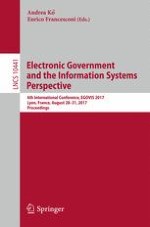This book constitutes the refereed proceedings of the 6th International Conference on Electronic Government and the Information Systems Perspective, EGOVIS 2017, held in Lyon, France, in August 2017.
The 20 revised full papers presented were carefully reviewed and selected from 24 submissions. The papers areorganized in the following topical sections: digitalization and transparency; open data ecosystems; intelligent systems in e-government; e-government research and intelligent systems; m-government and inclusion; e-government cases - data knowledge management; and knowledge management in the context of e-government.
